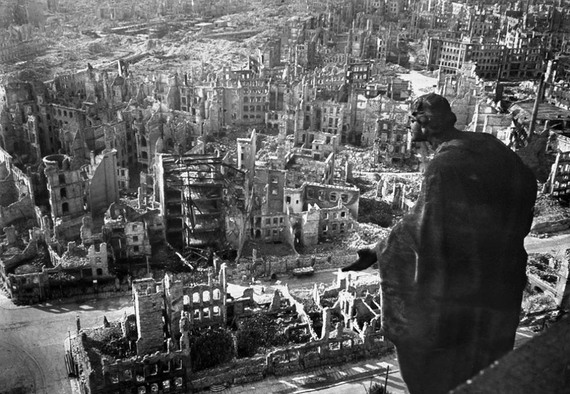 A view taken from Dresden's town hall of the destroyed Old Town after the allied bombings between February 13 and 15, 1945.
A view taken from Dresden's town hall of the destroyed Old Town after the allied bombings between February 13 and 15, 1945.
On the eve of one of the biggest potential turning points for modern-day Britain, the dream for an ever closer European union stands at risk. As a European growing up in Germany and studying in England, I always fancied the dream of a united Europe.
As an undergrad in London it took me a while to get used to the oddities of British life. I always thought that London, which carries the economic weight of the island, always cherished a diversity of perspectives and culture. It is a melting pot just like New York.
No matter what the result of the vote tomorrow, I hope that the dream of a more united Europe will be cherished more by future generations and the gift of a peaceful Europe that we taken for granted will not be put at risk so lightly. In a world that grows ever more connected, not only because of the internet, we need to build bridges, not burn them. We forget that for most of its history Europe was at war.
Over the last weeks media outlets and experts from all over the world have discussed -- ad nauseam -- the consequences and ramifications of the vote tomorrow that will shape the island's future, and possibly the entire continent. What else is there to say?
British prime minister David Cameron urged his fellow citizens, "quitting Europe is a risk to your family's future because a vote to leave on Thursday means there is no going back on Friday."
Billionaire investor George Soros predicted that a vote to leave the EU would devalue the pound immediately. "A vote to leave could see the week end with a Black Friday," he wrote in The Guardian yesterday, "and serious consequences for ordinary people."
The Bank of England, the Institute for Fiscal Studies and the IMF predicted that the annual income loss per household would be £3,000 to £5,000.
Large parts of the debate have focused on economic questions. Will we be better off if we stay or will we be better off if we leave? It is a selfish and shortsighted question. Any appeals that have been made were based on the economic questions. There is nothing wrong with that kind of persuasion. As Founding Father Benjamin Franklin understood, "If you would persuade, appeal to interest not to reason."
Regardless of the outcome, we need a stronger vision for Europe, one that builds upon the foundation made after World War II. Following the war, the late British Prime Minister Winston Churchill was convinced that only a united Europe could guarantee peace. At a speech in Zurich in 1946, he formulated his conclusions:
"There is a remedy which... would in a few years make all Europe... free and... happy. It is to re-create the European family, or as much of it as we can, and to provide it with a structure under which it can dwell in peace, in safety and in freedom. We must build a kind of United States of Europe."
We need to see ourselves as Europeans first, not members of the individual countries. We need to think like Europeans, and not just maximize the interest of our nation. We need to consider the moral implications, not just the economic ones. As Churchill astutely proclaimed, we must build a kind of United States of Europe.
That is not to say that we need to model ourselves after the United States entirely. Unfortunately most Europeans don't see themselves as Europeans. Just like in the Euro Cup, we can co-live peacefully and cooperate with each other without suppressing our different cultures. Britain can remain part of the European Union without compromising its identity.
The idea of a United States of Europe seems idealistic. How can we ever bring it into reality? After World War II there was an opportunity to re-imagine the world, to create a new Europe free from war. It seemed impossible at the time. Yet it all started with how we thought about the future. As Mahatma Gandhi said, "A man is but the product of his thoughts. What he thinks, he becomes." So it is with people and societies. The implementation wasn't perfect, but we did it. The peace and prosperity that followed are now so ingrained in everyone's minds that we can easily forget it.
If we want to build a new future for Europe, that builds upon that initial foundation, we need to collectively think different.
Don't think that if Britain votes to stay in the EU, the negative current that has been intellectually dissolving Europe will disappear. Don't put your faith into politicians and the elite. The world is changing, and becoming more decentralized. As citizens you have more power than you think.
One thing that will certainly stay intact is the collective and shared memories that bind us together as Europeans. Rather than focus on our differences, lets focus on keeping European influence in the world strong. Just how we benefit from American, African or Asian culture, so can the world benefit from a more united Europe.
